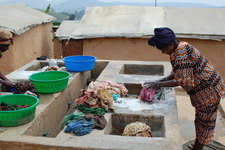For the past month, my suburban community has been slowly making improvements to our sewer system.
Truthfully, I don't exactly understand the details.

What I do understand is that when the Insituform truck arrives outside my house, it's going to be a bad day.
Shortly after this truck arrives, plumes of horrendous smelling smoke will rise from the sewer that sits just off my driveway.
The truck will then block my driveway, trapping me in my own house.
Worse still, the arrival of this truck means that my water will soon be cut off for the remainder of the day.
The first time this happened, I tweeted this:
So annoyed my town shut off our water for the day so they could make sewer improvements. #FirstWorldProblems
— Jen Bradbury (@ymjen) August 15, 2013
How embarrassing to have said such a thing on social media, especially since I have been to places where a lack of water is not just a rare inconvenience, but a daily struggle.
In college, I studied abroad in Moscow, Russia. There, we'd keep a container of water next to the toilet so that on the mornings we awoke with no water, we'd still be able to flush. Such things happened semi-regularly in Moscow, without any explanation. But eventually -sometimes after hours, sometimes after a few days - our water would be restored and life would resume.
A decade later, I had the privilege of leading a short-term mission team to Rwanda to work with Impact Rwanda, a long-term ministry of International Teams.
There, we experienced a brief period in which our guesthouse in Kigali, the capital city, had no water. In retrospect, it was a mere inconvenience, a reminder of the fact that throughout Rwanda, many do, in fact, live with very limited (or even without) access to clean water.
Take, for example, the thousands of Congolese refugees who have fled the ongoing conflict in the Congo and found sanctuary in Kiziba Refugee Camp in western Rwanda.
To be sure, there is water in Kiziba. A few spigots supply water for the ~20,000 refugees living there.
Such water is a precious commodity, which must be fetched on a daily basis in order to meet a family's needs. As a result, such water is used primarily for drinking and for necessary food preparation. Things that we consider a necessity here – like daily baths – are, for those living in Kiziba, a luxury.
Unfortunately, water is not the only precious commodity in Kiziba.
So, too, is food, healthcare, education, and hope.
For people who have been forced to choose between being killed or fleeing to a neighboring country, where is hope?
For people who can literally see their homeland from their refugee camp and yet know they cannot return to it, where is hope?
For people who measure their time in the refugee camp not in days, weeks, or months but in years, where is hope?
For a generation born and raised in Kiziba, where is hope?
For people who are free to leave and yet who are, for all intent and purposes, trapped in Kiziba, where is hope?
For these people – for refugees living in Kiziba - hope is International Teams' Impact Rwanda.
Hope manifests itself in the sports tournaments hosted by Impact Rwanda on school holidays. Such tournaments bring joy to the camp. They provide teens with a safe activity to participate in. They give those in the camp something to rally behind and cheer about.
Hope is found in the Kiziba library funded by Impact Rwanda – a refuge for so many in the camp and a way for those in the camp to learn and grow.
Hope comes in the way Impact Rwanda provides a few refugee kids with the opportunity for education beyond that which is provided by the camp.
Hope comes in the form of the long-term partnership that Impact Rwanda has with those in the camp; With the way in which it comes alongside refugees and says “What would make life better in the camp?” and once they know the answer to that question, “How can we help you make that happen?”
Hope comes in how Impact Rwanda invests in young leaders within the camp and in so doing, reminds them they are loved and not forgotten.
Certainly, water, food, and healthcare are vital necessities in a place like Kiziba.
But so is hope.
Hope begets more hope.
What's more, hope has the power to change everything.
Because I know this, this fall, I am once again riding in International Teams' Ride for Refuge on Saturday, October 5. The money I raise will support the ongoing work of International Teams' Impact Rwanda in Kiziba Refugee Camp.
Your gift – in any amount – will infuse hope into Kiziba.
And that hope can and will change everything.
Click here to support the on-going ministry in Kiziba by giving to Jen's Ride for Refuge.
